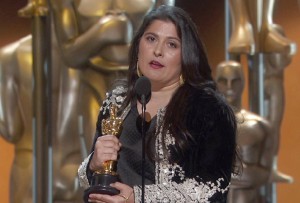. . WOMEN’S EQUALITY . .
A blog by Aleena Naqvi
Filmmaker Sharmeen Obaid Chinoy has once again delivered an Oscar worthy documentary and this time she has focused on one of the most important and least debated topic in Pakistan. The documentary named “A Girl in the River – The Price Of Forgiveness”, is based upon the controversial and yet quite common practice of honour killing in Pakistan. [Editor’s note: This film won the Hollywood best documentary short Oscar on February 28. The blog was published on February 14.]

Video of Oscar award to Filmmaker Sharmeen Obaid Chinoy
It follows the story of an eighteen year old girl Saba who luckily survived a brutal attack by her own father and uncle. She was able to get justice with the help of the local police who arrested and imprisoned the culprits of this gruesome crime. But unfortunately, Saba succumbs to the pressure of the society and forgives the culprits, as a law exists which allows the guilty people to be forgiven by the victims exists in Pakistan.
Surviving an honour killing assault is a very rare thing and it is virtually impossible to find any Pakistani man who has ever been punished for honour killing. It can be said that honour killing is not even considered a crime in this country which is not just sad but shameful as well.
Do you know:According to Pakistan’s Human Rights Commission there were 791 honor killings in the country in 2010. (Source: Wikipedia)
Sharmeen Obaid Chinoy knew the significance of the story she was telling. Pakistan is a country which is not understood very well in the West. The image of this country in the eyes of the West has not been a very promising one and it has often been linked to Islamic extremism, therefore, it was important to portray honour killing for what it really was instead of getting the wrong message across. Honour killing in Pakistan has nothing to do with faith and religion, it is rather a “premeditated, cold-blooded murder” and there are very different forces that are at play in it.
(Article continued in right column)
Protecting women and girls against violence, Is progress being made?
(Article continued from left column)
There are certain different factors which play an important role in existence of this crime. They include involvement of the state, the influence of local elders, there is a silent battle between women’s rights and need for family compromise, the financial insecurity and problems versus the fight for justice.
The main objective of this documentary is to tell the story of Saba and make people realize that killing Pakistani women in the name of honour is a crime. People will never try to stop or fight against it if they do not think of it as anything wrong. Sharmeen Obaid says that it essentially forces people to ask themselves questions like whether or not this act stands any good place in our religion at all. Should it be a part of our culture? Being a human how can we ever allow such a brutal and hideous thing to happen in our society? How important is it to stop it and consider it a crime?
The recognition that this Pakistani film has got on the international level is very useful in making people aware of the necessity to fight against it. Chinoy was much surprised by the level of attention that was given to Saba’s case by the services of the government. Their attitude and behavior allows people to challenge the parts of the system that did not work in favor of the victim.
Sharmeen Obaid Chinoy has planned to arrange the screening of the documentary in several colleges and schools all across Pakistan. An Oscar nomination was also able to bring the attention of Prime Minister Nawaz Sharif to this vital matter. Hopefully it will have a lot more impact in this country and will help in prevention of this crime in the near future.
[Editor’s note: Following the Oscar award, Prime Minister Nawaz Sharif praised the award and stated that his government is in the process of pushing a law to stop the killings. He said “Women like Ms. Sharmeen Obaid-Chinoy are not only a pride for the Pakistani nation but are also a significant source of contribution toward the march of civilization in the world.”]